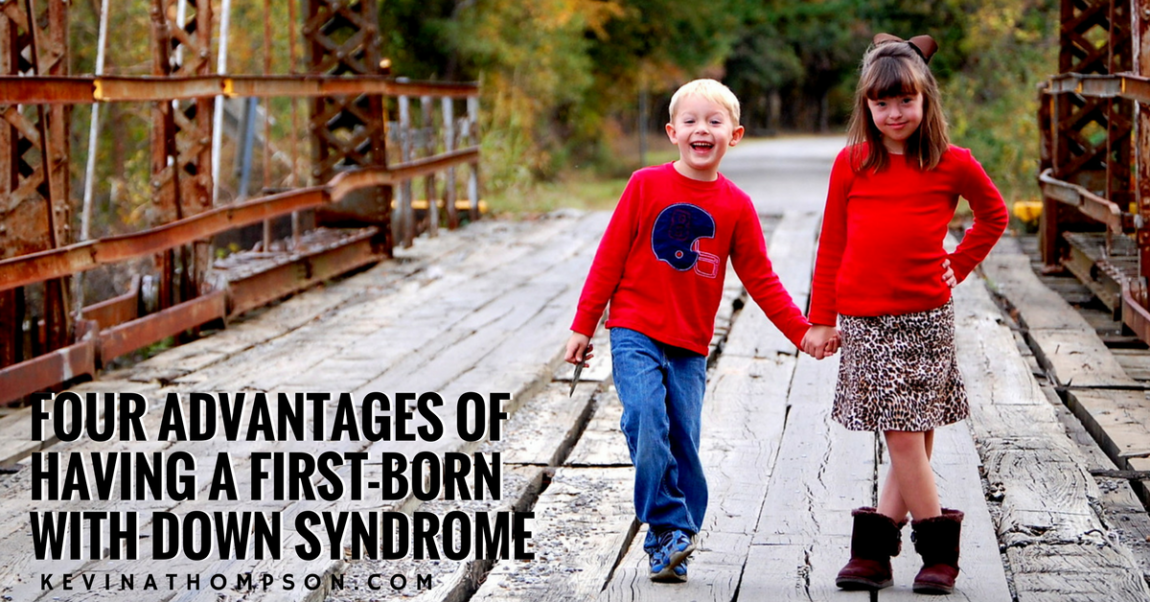Hours after our first born, Ella, made her entrance to our world, the doctors delivered the diagnosis of Down Syndrome. While he did a masterful job with the news, everything was a blur. People didn’t know how to treat us–should they be happy or empathetic? We didn’t know what to say or do. Everything was new. We didn’t know if what we were feeling was because we were parents or because we were parents of a child with special needs.
In retrospect, we wouldn’t have changed anything. We are grateful we had an uneventful pregnancy. There was no reason to consider a diagnosis beforehand. We are thankful for everyone involved in Ella’s birth; they were professional, compassionate, and helpful. While there would be benefits had our son been born before Ella, there were many perks of our first child being born with Down Syndrome.
Four Advantages
1. Grades. “Don’t worry about it.” Those were my words last week when Jenny was looking at a paper of Ella’s. I don’t care what grade she makes on a quiz about Greek Mythology. With either of my children, as long as they try hard, the actual grade doesn’t matter. But with Ella, on some things, I don’t even care if she tries hard. She’s working hard enough in a variety of situations, so some tests just don’t matter. I’d rather she sleep than study mythology. I’d rather she have fun than stress about a test. Ella helps me have a better perspective regarding grades. They are important, but they aren’t vital. Silas should thank his sister for this approach.
2. Sports. The greatest surprise of my parenting life is how little we care about sports. I love sports. I grew up a sports junkie. Yet when Ella was born, sports took a backseat. When Silas came along, I realized I didn’t want them as obsessed with sports as I am. I love for them to play. Being in good physical condition is important. But I’d rather not organize our whole lives around kids sports. It would be fun to have them engaged in athletic endeavors but not ruled by them. When Ella was little, we worked so hard on basic skills that we didn’t have time for tee-ball or basketball or other sports little ones play. Looking back, this was a gift. (See: I Want My Child to Lose)
3. Miscarriage. Other than the initial announcements, I’m not sure we have ever publicly spoken about a miscarriage we experienced between Ella and Silas. We’ve stayed quiet because the experience was greatly influenced by Ella. While men often struggle to comprehend the emotions around a miscarriage, Jenny did not (and does not) feel the deep emotions after we found out the news. Her perspective was that it was God’s design for the body to miscarry if something was wrong. When it happened, she was sad, but she trusted that this was for the best. In no way does she believe everyone should feel this way. I do not put her in contact with other women when they have a miscarriage because I don’t want them feeling guilty over their grief. It just wasn’t our experience. (See: Four Things Never to Say to Someone Grieving)
4. Future. Having a child with Down Syndrome greatly changes how one views the future. More than others, we have to consider who will have guardianship if something were to happen to us. We think through the financial implications of decisions. While we are raising Silas to one day leave our house, we don’t know if Ella will forever be with us or be on her own. Many couples look at their older years as a time of retirement, an opportunity to travel, and a chance to do things they’ve never done. We don’t necessarily view it that way. We try to fit in many of those things now knowing it might be easier to travel today rather than years from now. Overall, the future is something to be considered, but the present is a greater focus.
Those are the four things that come to my mind when it comes to having a first child with Down Syndrome, but I asked Jenny to add a fifth.
5. Appreciation. After Ella was born, we were immediately whisked into a world of additional doctors, nurses, therapists, specialists and teachers. At six weeks old, she was attending a therapeutic learning daycare five days a week. When you are still adjusting to a diagnosis, trying to find the right “daycare” for your daughter with special needs becomes extremely emotional and of utmost importance. We were fortunate to find a wonderful place where every teacher and therapist had such a passion and heart for kids like Ella. It was humbling, to say the least. As Ella grew and started elementary school, we continued to experience that same appreciation for her Kindergarten teacher, principal, and school therapists, to her sixth grade teachers today as she prepares to transition to junior high. Every single year my appreciation grows as those in the helping professions invest so much of themselves into our daughter. She has been loved well, indeed. (See: Five Principles for My Daughter’s Teacher)
While having a child with special needs has it’s unique challenges, for the most part, parenting is parenting. We feel what everyone else feels. We do whatever is necessary. Yet having a child with Ds does have its advantages. These are some.
If you have a child with special needs, what is one benefit of your experience?




4 Responses to Four Advantages of Having a First-Born with Down Syndrome